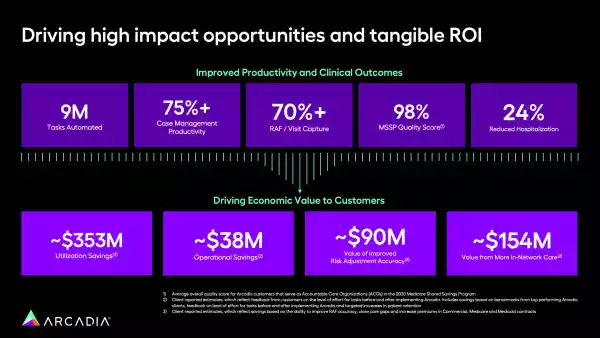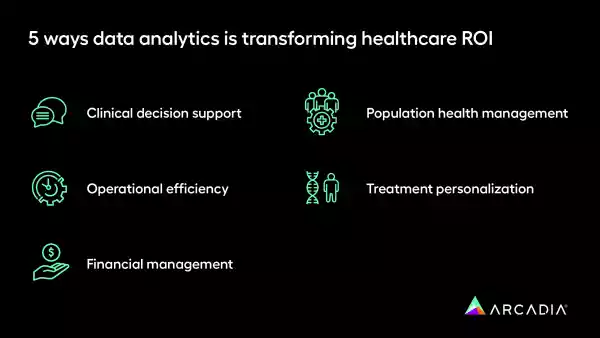5 ways data analytics drives impact and ROI in healthcare
From an analyst’s desk to the exam room, learn how data analytics makes healthcare more impactful and efficient.
Modern healthcare produces a staggering amount of data, and the organizations that thrive can spin this resource from information into insights using data analytics. It’s not enough to collect data — an analytics platform turns these data points into action.
In this article, we’ll discuss the impact of data analytics on a healthcare system’s return on investment (ROI). From clinical decision support to financial management, learn how a healthcare data analytics platform can unlock higher efficiency and more effective care.
The importance of ROI in healthcare
ROI is a key consideration in many verticals, and healthcare is no exception. With limited resources, from funding to staffing woes, it’s important that healthcare organizations measure what they’re getting out of investments. Whether it’s a new technological tool or a care management initiative, healthcare leaders must keep a finger on the pulse of performance.

Data analytics makes measuring ROI manageable in many ways. Automation capabilities (like automated outreach) reduce the need for manual labor and allow employees to accomplish more with fewer resources. Data-driven insights improve productivity, allowing care management programs to focus on what works. This led to an increase of 75%+ productivity for Arcadia customers. Finally, reduced hospitalizations mean more resources and space to address preventive care, and patients can avoid inconvenient or unnecessary hospital stays.
5 ways data analytics is transforming healthcare ROI
You can’t assess what you can’t measure. Data analytics gives healthcare systems the tools they need to determine where they stand. From there, it’s a matter of closing the gap between how things are now and how they could be in a better, more efficient future. Here’s how healthcare data analytics makes that happen:

1. Clinical decision support
The investment: Providers and care teams.
The return: Even the smartest, most capable clinical teams need evidence and data to make the best decisions. Instead of relying solely on judgment or instinct, both of which are fallible, data analytics provides evidence that points toward possible diagnoses or effective treatments. With workforce shortages and heavy workloads, this data can speed up the diagnostic process and ensure patients receive the best care. Features like point-of-care generative AI, for example, can quickly comb through thousands of pieces of data to find “needle in the haystack” insights, like an undocumented medical condition.
2. Operational efficiency
The investment: Administrators and administrative systems.
The return: A healthcare network contains many moving parts, and tracking those simultaneously is data analytics’ forte. Hospitals need beds available when patients arrive, and staff needs to be robust enough to handle the volume of patients coming through the doors. An analytics platform lets these systems streamline hospital operations.
3. Financial management
The investment: Auditors, billing specialists, and a team of financial experts.
The return: With thin operating margins, financial efficiency is more important in healthcare than ever. Data analytics delivers a clear picture of program costs and the amount recouped. An analytics platform delivers a holistic picture of organizational performance, facilitating more efficient billing, insurance claims, and financial planning.
4. Population health management
The investment: Population health specialists, outreach programs, and education.
The return: Public health issues are a notoriously difficult category to measure and monitor, so data proves especially critical in this arena. Great data platforms incorporate census data and other non-clinical sources so that a healthcare organization can augment its files with real-world information. From food insecurity to transportation issues, this knowledge of social determinants of health (SDoH) allows systems to discover creative, holistic interventions, often outside hospital walls.
5. Treatment personalization
The investment: A commitment to excellent patient care and providing the best course of treatment.
The return: Data allows healthcare organizations to stratify patients, identifying those with chronic illness (and those at risk of developing them). But it’s also a key tool for improving diagnoses. This article from the JCO Clinical Cancer Informatics journal describes how sophisticated data models can identify specific drugs and treatment courses based on a patient’s individual disease presentation. Combining providers’ years of expertise and experience with data-driven insights combines the best of human empathy and digital discoveries.
Grow your investment in healthier, happier lives
Data analytics plays a critical role in driving impact and enhancing ROI. But behind all those zeroes and ones are human lives. A healthcare data platform can keep people happier, healthier, and free of preventable illness.
Your investment in smoother systems and forward-thinking care starts now. Learn how you can equip your organization with a data analytics platform that maximizes efficiency and powers clinical performance.
